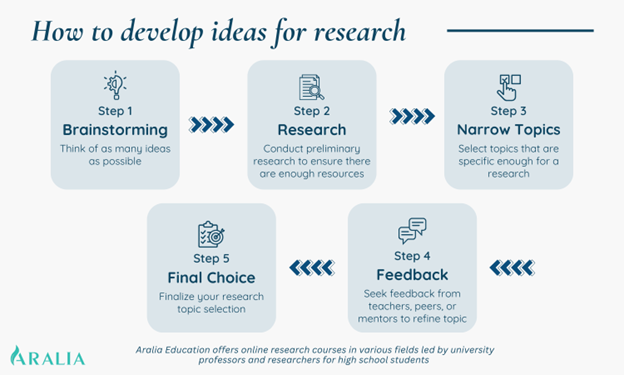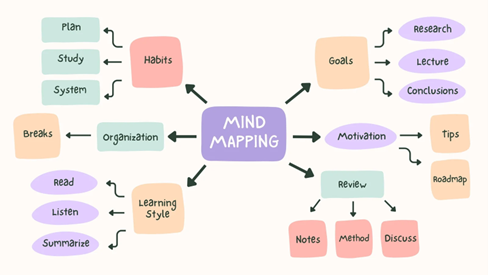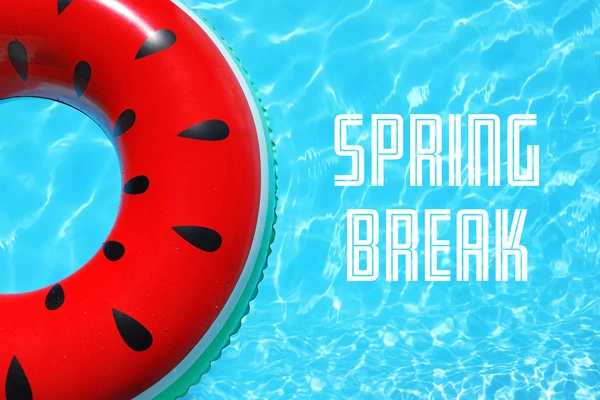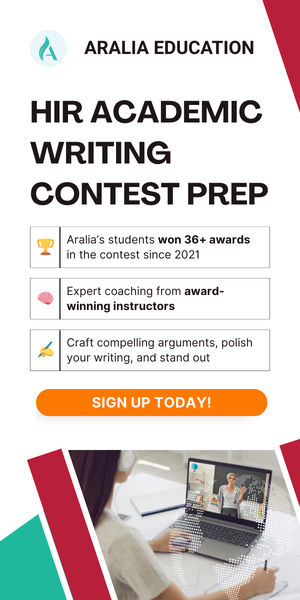1. The Importance of Research to High School Students
For high school students looking to enhance their academic profile, engaging in scientific research is an excellent approach. Research offers the opportunity to explore a topic or subject you are passionate about. It not only sharpens skills in analysis, writing, and problem-solving, but also deepens your knowledge in areas of interest. By immersing yourself in a subject, you gain the chance to think critically, synthesize information, and present your findings clearly.
Completing a research paper is more than just an academic task; it fosters intellectual curiosity, promotes independent learning, and prepares you for higher education or future careers. Participating in scientific research is also a powerful way to demonstrate your passion and enthusiasm for your desired major to university admission officers. Let’s read below to learn about creating ideas for a research paper!
2. How to Develop Ideas for Research Paper

Step 1: Brainstorming
The first step in developing a research topic is brainstorming. There are various brainstorming methods, but the most straightforward approach is to focus on subjects that spark your interest, whether related to your school curriculum or personal hobbies. For example, if you love art, you might think about an artist you’d like to learn more about; if you’re passionate about biology, consider questions you’re curious to explore further. Think about issues you care about or questions you’ve always wanted to answer. For group brainstorm sessions, you can visit this guide from MIT.
During the brainstorming process, it’s crucial to generate as many ideas as possible without judgment. Don’t hesitate to write down everything that comes to mind—sometimes, even the most unexpected thoughts can lead to fascinating research topics. If you’re struggling to come up with ideas right away, don’t worry. Creative insights often come at the most surprising times, so stay open to them. Inspiration might strike when you least expect it, whether you’re in the shower or dreaming at night.
If you are interested in historical or psychological research, we have some suggestions that can be found in our articles, which include 40 historical research ideas or 10 psychology research topics for high school students. We also have Research Paper Examples for High School Students to help you get started.
Step 2: Preliminary research
Once you have a few ideas from brainstorming, it’s time to conduct preliminary research to assess whether enough material is available for your chosen topic. While all ideas are valuable, research requires more than just an interesting concept—you need access to reliable sources that can help you answer your questions or support your conclusions. Look for articles, books, and credible online resources that introduce your topic and highlight its key themes.
Preliminary research also helps you determine whether your topic is broad or specific enough to explore in-depth for your research paper. This step is essential as it provides clarity on the direction of your research, helping you refine your topic and focus on the most relevant aspects.
Step 3: Narrowing down your research topic
After completing your preliminary research, it’s time to narrow down your topic. A strong research topic should be specific enough to be manageable, yet broad enough to allow for in-depth exploration. For example, rather than researching the general topic of “climate change,” you could focus on a specific aspect like “the impact of climate change on coastal cities.”
A well-defined topic will help keep your research focused and your writing organized. It’s important that your research not only deepens your understanding of the subject but also provides valuable insights for your readers. If you’re unsure about how broad or specific your topic should be, you can refer to these guidelines from the University of Southern California Library, to help you refine your focus.
Step 4: Seek feedback and recommendations
Once you have a refined topic, seek feedback from your teachers, peers, or mentors. Sometimes, an outside perspective can help identify areas for improvement that you might have missed. They may provide valuable insights on how to further refine your topic or suggest new approaches.
If you’re working on research with a group or students, discussing the refined topic is crucial, as it can generate constructive feedback and ideas that help move the project forward. If you’re working with a mentor, their expert guidance can be invaluable in steering your research in the right direction. Don’t hesitate to share your work with others—collaborating and receiving feedback is an essential part of the research process.
Step 5: Finalize your choice
After gathering feedback and making any necessary adjustments, it’s time to finalize your research topic. At this stage, it’s important to ensure that you are genuinely excited and motivated about the topic you’ve chosen. The most successful research projects often stem from subjects that spark your curiosity and passion. When you care about the topic, it will keep you engaged and focused throughout the research process, making it easier to overcome challenges and stay motivated.
Take the time to reflect on your interests and how they align with your research topic. Are you truly curious about this subject? Do you feel passionate about learning more? Remember, research can be a lengthy process, so choosing a topic that excites you will help sustain your enthusiasm and drive, leading to a more rewarding and insightful experience.
3. Tips and Resources to Help You Come Up With Good Research Idea
Combine your interests: If you’re struggling with a brainstorming block during the first step, a helpful tip is to combine different interests rather than focusing on just one. For example, if you’re passionate about both art and coding, you could explore how software, digital applications, or AI are transforming the art world. Similarly, if you’re interested in content creation and want to learn more about environmental issues, you might consider investigating how social media has influenced the way people raise awareness about climate change. By merging your diverse interests, you can uncover unique and exciting research topics that will inspire and motivate you throughout the process.
Always note down your ideas: Great research ideas can come at any time, and it’s important to capture them when they arise. Keep a notebook or digital document handy to jot down any potential topics or questions that come to mind. Over time, reviewing these notes can help you find patterns or ideas you may want to explore further.
Use a mind map: A mind map is an excellent tool for visualizing your thoughts and organizing ideas. By combining your notes with a mind map, you can structure your ideas more clearly, uncover new insights, and spark additional creative ideas. This method helps you see connections between concepts, making it easier to expand and refine your research topic.

Only rely on high-quality sources: When you start your research, always use reliable sources like academic journals, books, and trusted websites. High-quality sources make sure your research is credible, and your arguments are based on accurate information. Avoid using random sources that you can’t verify, as incorrect information can lead to the failure of your research. Sticking to trustworthy sources is key to making sure your work is successful.
Ask an AI assistant: Don’t hesitate to use AI tools to assist with brainstorming and refining your ideas. AI assistants like ChatGPT can offer suggestions, help you outline research questions, and even propose relevant topics based on your interests. They can also guide you in organizing your research. However, it’s important to remember that not all information from AI tools is guaranteed to be accurate, so always double-check the details using verified sources to ensure the reliability of your research. If you’re unsure how to effectively use AI like ChatGPT in your research process, check out our comprehensive guide on how high school students can use AI for academic success.
Get help from experts: Don’t hesitate to reach out to professionals or experts in the field you’re researching. Their guidance can not only help steer your research in the right direction but also increase its significance, potentially leading to publication in a journal for high school students. For example, if you’re exploring a scientific topic, you might contact a local university or research organization for advice or interviews. You can also connect with Aralia for support in scientific research, as we can link you with professors and researchers from various universities to help you start a research profile from high school.
4. Common Mistakes to Avoid When Choosing a Research Topic
When choosing a research topic, it’s important for high school students to avoid common mistakes that can make the process more challenging or less rewarding. Here’s a breakdown of what to watch out for:
Avoid plagiarism: plagiarism means using someone else’s ideas, words, or work without giving them proper credit. When choosing a research topic, you can pick a topic that people already work on. Still, you need to provide additional information and insights to that topic and make sure to credit the sources of the works you used in your research paper.
Too broad or too narrow topics: if your topic is too broad, like “climate change,” it can feel overwhelming because there’s so much to cover; if your topic is too narrow, like “the impact of climate change on your 2 cats at home” you might struggle to find enough articles or research for information. The key is to find a middle ground—a topic that is focused enough to be manageable but broad enough to allow for thorough research and analysis.
A too recent topic: Be cautious when selecting a new or trending topic for your research. While it might seem exciting to explore something new, there may not be enough data or existing research available to support your work. Before committing to a recent topic, conduct thorough research to ensure there are sufficient resources and information to explore.
You’re not interested in the topic: One of the most important factors in choosing a research topic is ensuring it’s something you’re genuinely passionate about. It’s easy to feel pressured when your friends work on different topics, but ask yourself this: Do you want to spend months reading, researching, and writing about something that doesn’t excite you? Research can be a long and demanding process, and your interest in the topic will be the key to staying motivated. Choose a subject that sparks your curiosity and aligns with your interests—it will make the journey much more enjoyable and rewarding.
Letting personal opinions take over: For example, if you’re a huge basketball fan and decide to research the impact of basketball on high school students in your state, you might be tempted to focus only on the positive aspects. However, good research requires objectivity. To create a meaningful and impactful study, learn to set aside your personal perspective and approach the topic with an open mind. This will ensure your research is balanced, credible, and insightful.
Coming up with ideas for a research paper doesn’t have to be overwhelming. By following these steps and utilizing the tips provided, high school students can easily develop compelling, focused topics that not only align with their academic goals but also fuel their curiosity and passion. Remember, research is an opportunity to learn and discover new things, so take your time and enjoy the process of exploring new ideas!
Further readings:
Conduct Research with Aralia Instructor
If you’re eager to build a research profile in high school but unsure where to begin or where to find guidance, Aralia offers the perfect program to support your journey. We connect students with experienced instructors who specialize in guiding young researchers from the ground up. Our instructors are seasoned experts from top universities and research institutes, bringing years of experience in mentoring students. They will provide step-by-step guidance, helping you craft a well-structured and comprehensive research paper with the potential to be published in academic journals. Start your research journey with Aralia and turn your curiosity into impactful work.










